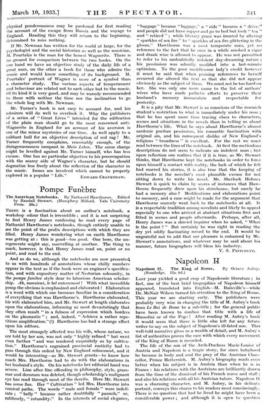Pompe Funebre
Press. 30s.)
THERE is a fascination about an author's notebook, a workshop odour that is irresistible ; and it is not surprising to find Henry James confessing he read every page of Nathaniel Hawthorne's notebooks, though entirely unable to see the point of the prolix descriptions with which they are filled. Henry James wondering what on earth Hawthorne was getting at : this is good—too good. One bore, the un- regenerate might say, marvelling at another. The thing to mark, however, is that Henry James read on, point or no point, and read to the end.
And so do we, although the notebooks are now presented, to us with hundreds of annotations whose chilly numbers appear in the text as if the book were an engineer's specifica- tion, and with expository matter of Nestorian solemnity, in the pompe funebre style dear to laborious American scholar- ship. Ah, monsieur, le bel enterrement ! With what incredible pomp the obvious is emphasized and elaborated ! Elaboration is a word with which one becomes familiar in a consideration of everything that was Hawthorne's. Hawthorne elaborated, his wife elaborated him, and Mr. Stewart at length elaborates upon the elaborations, informing us most devastatingly that they often result " in a fulness of expression which borders on the pleonastic " ; and, indeed, " Achieve a rather repe- titious amplification." (!) Hawthorne has had a strange effect upon his editors.
The most strangely affected was his wife, whose nature, we are told her son, was not only " highly refined " but went even further " and was rendered exquisitely so by cultiva- tion." Hawthorne's engrained provincial rusticity had' to Pass through this ordeal by New England refinement, and it Would be interesting—as Mr. Stewart grants—to know how much Mrs. Hawthorne had to do with the elaborations in her husband's style. On his notebooks her editorial hand was severe. Line after line offending in philosophy, style, gram- mar and decorum was deleted, though scholarship's malignant eye has read through most Of the deceits. Here Mr. Stewart has some fun. Her " Cultivation " led Mrs. Hawthorne into comical paths. The words " male and female " were indeli- cate ; " belly " beeame rather doubtfully " paunch," or, sublimely, " rotundity." In the interests of social elegance, "baggage" became "luggage," a " ride " became a " drive," and people did not have supper and go to bed but took " tea and " retired " ; while literary grace was insured by altering " sparkles of sea fire " to " sparkles of sea fire glittering in the gloom." Hawthorne was a most temperate man, yet no reference to the fact that he once in a while smoked a cigar and drank wine is allowed to appear. He was not permitted to refer to his undoubtedly indolent day-dreaming nature ; his pessimism was adroitly modified into a last-minute optimism. To the poor meddlesome lady's credit however it must be said that when praising references to herself occurred she altered the text so that she did not appear obviously as the subject of them. We must not be too hard on her. She was only one more name to the list of authors' wives who have made pathetic efforts to preserve their husband's memory immaculate and respectable for posterity.
It is a pity that Mr. Stewart is so conscious of the research student's restriction to what is immediately under his nose ; that he has spent more time tracing clues to characters, scenes and situations in the novels than in -telling- us about Hawthorne's life. What he says about .Hawthorne's almost sardonic puritan pessimism, his romantic fascination with original sin, and his consequent dislike of New England's religious " broadness ". is excellent. For the rest we must read between the lines of the notebook. At first the meticulous descriptions do not seem to indicate an indolent man ; but upon reflection one realizes that if it is true, as Mr. Stewart thinks, that Hawthorne kept the notebooks in order to force upon himself a contact with reality, the lack of which he felt had marred his stories, it is also true that the keeping of notebooks is the novelist's most plausible excuse 'for not sitting down to write his novel. Mr. Sherlock Holmes Stewart is quick to claim by scores of instances that Haw- thorne frequently drew upon his storehouse, but surely he had a memory also ? Modifications and elaborations point to memory, and a case might be made for the argument that Hawthorne scarcely went back to the notebooks at all. It is a respectable tradition among novelists and likely to appeal especially to one who arrived at abstract situations first and fitted in scenes and people afterwards. Perhaps, after all, Henry James was a shrewd inquirer when he asked, " What Is the point ? " But certainly he was right in reading the dry yet oddly fascinating record to the end. It would be ungrateful not to add, that our pleasure is enhanced by Mr. Stewart's annotations, and whatever may be said about his manner, future biographers will bless his industry.
V. S. PuiTcuErr.






































 Previous page
Previous page